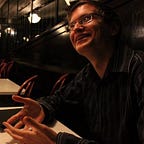Peak Experiences
Self-Transcendence on the Social Dance Floor
According to Albert Einstein, “the most beautiful emotion we can experience is the mysterious. It is the power of all true art and science. He to whom this emotion is a stranger, who can no longer pause to wonder and stand rapt in awe, is as good as dead.”
Awe, as defined by modern psychology, is the emotion we feel when we encounter something larger than ourselves, larger than our everyday experience, which requires us to broaden our frame of reference to accommodate it.
On the dance floor, there are many opportunities to experience this emotion: soaring waltz music, never-before-imagined dance moves, and the ultimate awe-inspiring mystery of how so many couples can dance without crashing, weaving in and out of each other on the crowded dance floor.
In addition to being a most beautiful emotion, awe is also a most beneficial one, associated with many positive outcomes.
Awe expands our perception of time, leading us to feel less pressed for time and less impatient. As a result, feeling awe leads us to more strongly prefer experiences—which are more time-consuming—over material possessions, which is beneficial because experiences are significantly more satisfying than possessions.
It also makes us more willing to volunteer our time to help others, which not only makes us feel good, but actually expands our perception of time even further. Awe also makes us want to spend more time in nature, which in turn makes us feel more alive, and more generous.
And last but not least, awe feels good itself, giving us an immediate boost in satisfaction.
Perhaps the most essential consequence of awe, however, is that if we are asked to describe ourselves while feeling awe, we are three times more likely to describe ourselves in universal categories (“I am a human being,” “I am an inhabitant of the Earth”) than self-focused categories (“I am tall,” “I am shy”). Feeling awe not only broadens our frame of reference to accommodate novel experiences of vastness, but also broadens our sense of identity so that we feel a part of something larger than our self, and feel more connected with the world around us.
This expansion of the self, or self-transcendence, becomes even more pronounced in experiences which reach the very pinnacle of awe, which Abraham Maslow called peak experiences.
According to Maslow, “the term peak experiences is a generalization for the best moments of the human being, for the happiest moments of life, for experiences of ecstasy, rapture, bliss, of the greatest joy.”
During peak experiences, we feel “wonder, awe, reverence, humility, surrender, and even worship,” and perceiving the universe as “beautiful, good, desirable, worthwhile,” “an integrated and unified whole,” of which we are an integral part. In addition, we come to see the world in terms of ultimate values which Maslow called “B-Values”—truth, goodness, beauty, wholeness, aliveness, uniqueness, perfection, completion, justice, simplicity, richness, effortlessness, playfulness, and self-sufficiency—and come to be primarily motivated by the same.
Having had a peak experience, we begin to see the world in a way that is more “ego-transcending, self-forgetful, egoless, unselfish,” and as a result, become “more loving and more accepting.”
Through peak experiencing, we finally grok what Einstein meant when he wrote: “A human being is a part of the whole, called by us “Universe,” a part limited in time and space. He experiences himself, his thoughts and feelings as something separate from the rest—a kind of optical delusion of his consciousness. The striving to free oneself from this delusion is the one issue of true religion. Not to nourish it but to try to overcome it is the way to reach the attainable measure of peace of mind.”
Interestingly, yet unsurprisingly, Maslow explicitly pointed to music and dancing as one of the most effective paths to peak experiences, and as an effective path of “growth toward full humanness.”
In fact, in imagining his ideal of education, Maslow placed music and dance education at its core, noting that they “are so close to our psychological and biological core . . . that rather than think of these courses as a sort of whipped cream or luxury, they must become basic experiences in education.”
Having researched and experienced the life-changing benefits of dancing, I really couldn’t agree more.
For more on the ideas of Abraham Maslow, see my essays “Synergy” and “The Peak of Maslow’s Hierarchy.”
This was a stub which never quite found a home in Waltzing: A Manual for Dancing and Living. I’m glad to be able to publish it here on Medium.
